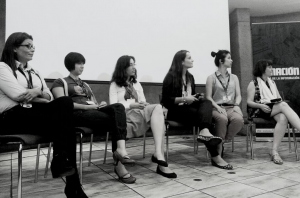
Speakers at the launch of Chicas Poderosas in Costa Rica discussed best practices for finding data, telling stories visually and creating interactive content.
Working in newsrooms with a multidisciplinary team of developers, journalists and designers became my everyday life when I was part of the Guardian Interactive team over the last three years.
This began with my former boss, Alastair Dant, who had the vision not only to start the Guardian Interactive team, but who recognized the need to place a woman in a key position on his team. This changed my life. It gave me the chance to work with a genius and to see that being a woman was actually making a difference in our everyday work environment, as we created news stories using cutting-edge technology and a disruptive attitude towards communication.
This made me want to share this experience with other women. That's why I'm launching “Chicas Poderosas” ("Powerful Women") in Latin America as part of my ICFJ Knight International Journalism Fellowship.
Chicas Poderosas aims to start a chapter in each Latin American country with representatives who will work as ambassadors spreading knowledge and the philosophy of embracing teamwork, believing in women who can make a change in technical environment in newsrooms. The idea is to empower women to believe in themselves and to work hard.
Read the full post from Mariana Santos on IJNet.
The International Journalists' Network, IJNet, keeps professional and citizen journalists up to date on the latest media innovations, online journalism resources, training opportunities and expert advice. ICFJ produces IJNet in seven languages: Arabic, Chinese, English, Persian, Portuguese, Russian and Spanish. IJNet is supported by donors including the John S. and James L. Knight Foundation.
Photo courtesy of Mariana Santos.